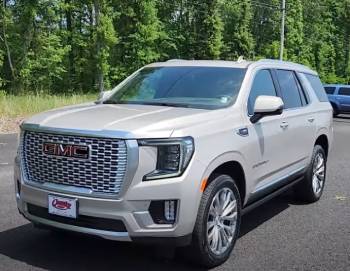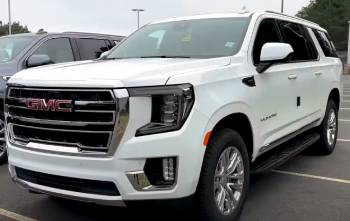When it comes to massive, road-commanding SUVs, GMC has a long-standing reputation. Two flag bearers in this arena are the GMC Yukon and its elongated sibling, the GMC Yukon XL. Both boast powerful presence, but what makes them different? And which one’s right for you?
Let’s jump right into this head-to-head showdown between the GMC Yukon XL and Yukon.
A Brief Comparison Table
| Feature | GMC Yukon | GMC Yukon XL |
| Size/Proportions | Full-size SUV | Extended full-size SUV |
| Interior Space | Spacious, tight third row | Very spacious in all rows |
| Fuel Efficiency | Slightly better | Marginally lower |
| Performance | Agile | Stable but less zippy |
| Price | Lower | Higher due to added size |
| Towing Capacity | Good for trailers/boats | Better for heavier trailers |

GMC Yukon: More than Just a Full-size SUV
Pros
- Size and Maneuverability:
Though it’s a full-sized SUV, the Yukon offers relatively easier maneuverability in tight spaces compared to its XL counterpart.
- Price:
Naturally, being the smaller variant, the Yukon is more pocket-friendly than the Yukon XL.
- Fuel Efficiency:
Less weight, even by a smidge, means the Yukon generally offers better fuel efficiency.
Cons
- Limited Cargo Space:
The Yukon has ample space, but if you’re looking for the ultimate cargo holder, you might find it a tad constraining.
- Passenger Comfort:
While spacious, third-row passengers might feel the squeeze, especially on longer journeys.
Also Read: Differences Between Shell Rotella And Mobil Delvac 1300 Super.
GMC Yukon XL: Taking Size and Comfort a Notch Higher
Pros
- Cargo King:

The Yukon XL has a considerably longer wheelbase, providing significantly more cargo space.
- Extended Legroom:
Not only does the cargo get more space, but your passengers in the third row will also be thanking you for the additional legroom.
- Better for Towing:
The added length and stability means the Yukon XL can handle heavier trailers with ease.
Cons
- Maneuvering in Tight Spaces:
The Yukon XL isn’t your best friend when you’re trying to park in congested areas or navigate narrow roads.
- Cost:
Larger size comes with a heftier price tag.
- Fuel Consumption:
Those few extra feet mean more weight, translating to slightly lesser fuel efficiency.
So, What’s the Real Deal?
Both these beasts cater to different needs. If you’re someone who regularly hauls a lot, be it for family vacations or business, the Yukon XL is your trusted companion. On the other hand, if you want the gravitas of a large SUV without the “extra-large” size, the Yukon is your pick.
GMC Yukon vs. GMC Yukon XL: The Battle of Size and Features
When discussing SUVs that have dominated American roads for years, it’s hard not to mention the GMC Yukon and its extended variant, the GMC Yukon XL. Both these SUVs come from the same family but offer a few distinct differences tailored to specific needs. Let’s delve deeper into these differences.
Size and Proportions
This is the most apparent difference.
- GMC Yukon: The standard Yukon is a full-size SUV. However, when it’s compared to its XL sibling, it seems a tad compact. The regular Yukon is easier to maneuver in tight spaces like city streets or crowded parking lots. Its size is optimal for those who want a large SUV without it being too vast.
- GMC Yukon XL: As the name suggests, the “XL” stands for “extra long.” The Yukon XL has a longer wheelbase and total length compared to the standard Yukon. This translates to more space inside, not just for passengers, but also for cargo. While it offers ample space, driving and parking the XL can be challenging in tight spaces.
Interior Space and Comfort
- GMC Yukon: The interior of the standard Yukon is spacious. It comfortably seats seven passengers, and the seating arrangement ensures decent legroom for the first two rows. However, the third-row passengers might feel a bit constrained during longer journeys.
- GMC Yukon XL: The XL shines when we talk about interior space. The extended wheelbase ensures that all three rows have ample legroom. Even third-row passengers can enjoy long journeys without feeling squashed. Additionally, the cargo space behind the third row is much more generous, which is particularly useful for family vacations or hauling large items.
Fuel Efficiency and Performance
The difference in size and weight slightly impacts fuel efficiency and performance.
- GMC Yukon: Being relatively lighter, the standard Yukon has a slight edge in fuel efficiency. Though both models might come with similar engine configurations, the standard Yukon may feel a bit more agile due to its smaller size.
- GMC Yukon XL: With the added weight and size, the Yukon XL might consume slightly more fuel than its counterpart. However, the difference isn’t too significant. Performance-wise, the XL handles almost as well as the standard Yukon, but the former’s longer length might make it feel less zippy.
Price Point and Value
- GMC Yukon: Naturally, with less metal and material, the Yukon comes at a slightly lower price point. It provides excellent value for those who desire the features and presence of a full-size SUV without the need for the extra space that the XL offers.
- GMC Yukon XL: Being larger and offering more space, the Yukon XL is priced a bit higher. For those who frequently find themselves needing more cargo space or carry many passengers regularly, the price difference can be justified.
Towing Capacity
Given their build and strength, both vehicles are quite capable of towing. However, there are slight variations due to their sizes.
- GMC Yukon: The Yukon is robust and can tow trailers, boats, or caravans without much hassle. Its size makes it easier to manage and maneuver while towing.
- GMC Yukon XL: The extended version, with its added stability from the longer wheelbase, can handle heavier trailers. For those who frequently tow large items, the XL might be the better choice.
Also Read: Is Having AAA Tire And Wheel Insurance Wise?
Frequently Asked Questions (FAQs)
The primary difference is size. The Yukon XL is an extended version of the Yukon, meaning it has a longer wheelbase. This results in more cargo space and increased legroom for passengers.
No, the main difference is in length, not width. The Yukon and Yukon XL have roughly the same width, but the XL version is longer.
The “XL” stands for “extra long.” This signifies that the vehicle has an extended wheelbase, translating to more cargo and passenger space.
The Yukon XL is bigger in terms of length and cargo space when compared to the standard Yukon.
Yes, the standard seating arrangement in the GMC Yukon is for seven passengers, though configurations can change based on the trim level and specific customizations.
Yes, the Yukon XL is available in a 4×4 configuration, making it suitable for various terrains and conditions.
Wrapping Up
Whether you’re team “Yukon” or waving the “XL” flag, it’s undeniable that both these SUVs are game-changers. They offer unrivaled presence on the road, packed with features and versatility. So, which side are you on? Whichever you choose, you’re in for a ride full of luxury, power, and style. Safe driving!
In summary, both the GMC Yukon and Yukon XL have their merits. Your choice boils down to your specific needs and preferences. Whether it’s the more compact and agile Yukon or the spacious and grand Yukon XL, both vehicles ensure a ride in luxury and style.




I’m disappointed no where does it mention the actual measurement of their differences.